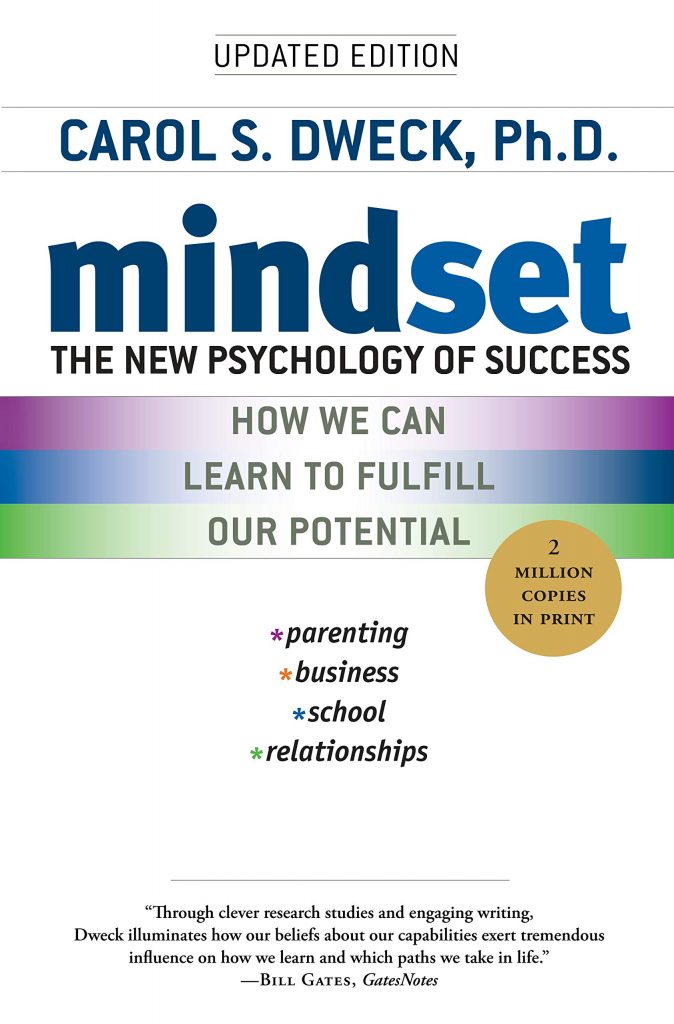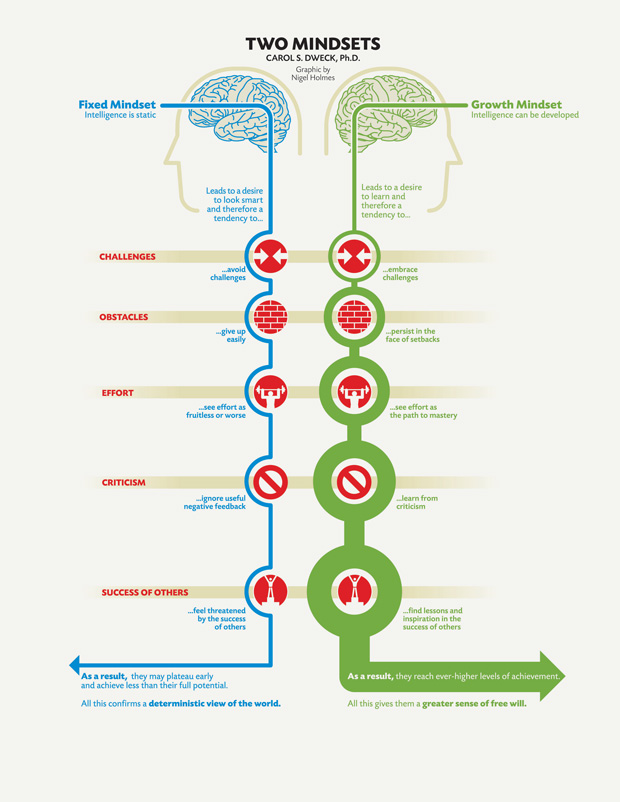Improve your investment outcomes by adopting a growth mindset
Improve your investment outcomes by adopting a growth mindset
We are what we believe we are
After decades of research, Stanford University psychologist, Carol Dweck discovered a simple but ground-breaking idea: the power of mindset.
In her classic book “Mindset: The New Psychology of Success”, she showed how success can be dramatically influenced by how we think about our talents and abilities.
Dweck summarised, “Individuals who believe their talents can be developed (through hard work, good strategies, and input from others) have a growth mindset. They tend to achieve more than those with a more fixed mindset, i.e., those who believe their talents are innate gifts. This is because they worry less about looking smart and they put more energy into learning.”
According to Dweck, believing that your qualities are carved in stone — fixed mindset — creates an urgency to prove yourself over and over. The fixed mindset makes you concerned with how you will be judged; the growth mindset makes you concerned with improving.
The good news is that we can change our mindset.
For example, a study in the United States showed that a short (less than one hour!), online growth mindset course improved grades among lower-achieving high school students (Yeager, D.S., Hanselman, P., Walton, G.M. et al., 2019). This is great because having a growth mindset can also improve investment success.
Growth mindset unlocks investment success
Adopting a growth mindset can improve our lives in many aspects, such as becoming better partners in a relationship, better parents, better managers and of course, better investors.
We found there are at least three reasons why growth mindset is an important concept for investors:
Improve our stock picking – companies with growth-mindset leadership perform better. Thus, recognising such leadership in companies can improve our stock-picking game and improve our investment outcomes.
For instance, a five-year study by Jim Collins in 2001 suggests that the stock returns of companies run by growth-mindset leaders were more likely to rise than those of rival companies.
Improve our forecasting skills – research has revealed that the best forecasters have growth mindset. For instance, in the book “Superforecasting: The Art and Science of Prediction”, the authors conclude from analysing forecasting tournaments that the strongest predictor of becoming an exceptional forecaster is the degree to which one is committed to belief-updating and self-improvement.
Improve our team’s decisions – when our own (analyst) team operates in growth mindset, forecasting performance will improve dramatically. For instance, in Superforecasting, it was found that the so called “superteams” do well by avoiding the extremes of groupthink and by fostering mini cultures that encouraged people to challenge each other respectfully, admit ignorance, and request help.
Adopting a growth mindset is especially important for us at our organization. Such mindset guides us in how we should change, how we should look at new areas and finetune our investment strategy.
You don’t get growth mindset by proclamation. You move toward it by taking a journey.
In the wake of Dweck’s findings and the success of her book, “growth mindset” has become a buzzword among educators and business leaders, even working its way into mission statements.
However, after publishing her book, Dweck discovered that people often confuse growth mindset with being flexible or open-minded or having a positive outlook — qualities they believe they’ve simply always had.
She calls this a ‘false growth mindset’. The point is that your “process” needs to be tied to learning and progress. It’s also false in the sense that nobody has a growth mindset in everything all the time.
Dweck clarifies that everyone is a mixture of fixed and growth mindsets: sometimes we’re in a growth mindset, and sometimes we’re triggered into a fixed mindset by what we perceive as threats.
These can be challenges, mistakes, failures, or criticisms that threaten our sense of our abilities. As such, a “pure” growth mindset doesn’t exist; it is a lifelong journey. Below is the summary of the journey that Dweck proposes.
The journey to a (true) growth mindset:
1. Embrace our fixed mindset – We need to acknowledge that we are a mixture of both mindsets. Even though we have to accept that some fixed mindset dwells within us, we do not have to accept how often it shows up, and how much havoc it can wreak when it does.
2. Become aware of our fixed-mindset triggers – Understand in what situations your fixed-mindset “persona” makes its appearance. As we come to understand our triggers and get to know our persona, don’t judge it. Just observe it.
3. Give our fixed-mindset persona a name. Yes, a name. Perhaps we might give it a name we don’t like, to remind us that the persona is not the person we want to be.
4. Educate our fixed-mindset persona. The more we become aware of our fixed-mindset triggers, the more we can be on the lookout for the arrival of our persona. Don’t suppress it or ban it. Just let it do its thing. When it settles down a bit, talk to it about how we plan to learn from the setback and go forward. Take it on the journey with us.
We feel that Dweck’s emphasis on the journey, instead of solely on the outcome, is a key point.
The more we learn the more we earn
Knowing the advantage of growth mindset could spark our lives, the choice to implement it is now in our hands. Anyone can develop a growth mindset and get ahead in their lives or fields of work. It is simply a treasure that everyone can possess through a perpetual journey. By applying growth mindset in investing, there are more opportunities we can seize and more vicissitudes we can evade.
“I constantly see people rise in life who are not the smartest, sometimes not even the most diligent, but they are learning machines.” – Charlie Munger
References:
Dweck, C. S. (2006). Mindset: The new psychology of success. New York: Random House.
Yeager, D.S., Hanselman, P., Walton, G.M. et al. A national experiment reveals where a growth mindset improves achievement. Nature 573, 364–369 (2019). https://doi.org/10.1038/s41586-019-1466-y
Share
We are what we believe we are
After decades of research, Stanford University psychologist, Carol Dweck discovered a simple but ground-breaking idea: the power of mindset.
In her classic book “Mindset: The New Psychology of Success”, she showed how success can be dramatically influenced by how we think about our talents and abilities.
Dweck summarised, “Individuals who believe their talents can be developed (through hard work, good strategies, and input from others) have a growth mindset. They tend to achieve more than those with a more fixed mindset, i.e., those who believe their talents are innate gifts. This is because they worry less about looking smart and they put more energy into learning.”
According to Dweck, believing that your qualities are carved in stone — fixed mindset — creates an urgency to prove yourself over and over. The fixed mindset makes you concerned with how you will be judged; the growth mindset makes you concerned with improving.
The good news is that we can change our mindset.
For example, a study in the United States showed that a short (less than one hour!), online growth mindset course improved grades among lower-achieving high school students (Yeager, D.S., Hanselman, P., Walton, G.M. et al., 2019). This is great because having a growth mindset can also improve investment success.
Growth mindset unlocks investment success
Adopting a growth mindset can improve our lives in many aspects, such as becoming better partners in a relationship, better parents, better managers and of course, better investors.
We found there are at least three reasons why growth mindset is an important concept for investors:
Improve our stock picking – companies with growth-mindset leadership perform better. Thus, recognising such leadership in companies can improve our stock-picking game and improve our investment outcomes.
For instance, a five-year study by Jim Collins in 2001 suggests that the stock returns of companies run by growth-mindset leaders were more likely to rise than those of rival companies.
Improve our forecasting skills – research has revealed that the best forecasters have growth mindset. For instance, in the book “Superforecasting: The Art and Science of Prediction”, the authors conclude from analysing forecasting tournaments that the strongest predictor of becoming an exceptional forecaster is the degree to which one is committed to belief-updating and self-improvement.
Improve our team’s decisions – when our own (analyst) team operates in growth mindset, forecasting performance will improve dramatically. For instance, in Superforecasting, it was found that the so called “superteams” do well by avoiding the extremes of groupthink and by fostering mini cultures that encouraged people to challenge each other respectfully, admit ignorance, and request help.
Adopting a growth mindset is especially important for us at our organization. Such mindset guides us in how we should change, how we should look at new areas and finetune our investment strategy.
You don’t get growth mindset by proclamation. You move toward it by taking a journey.
In the wake of Dweck’s findings and the success of her book, “growth mindset” has become a buzzword among educators and business leaders, even working its way into mission statements.
However, after publishing her book, Dweck discovered that people often confuse growth mindset with being flexible or open-minded or having a positive outlook — qualities they believe they’ve simply always had.
She calls this a ‘false growth mindset’. The point is that your “process” needs to be tied to learning and progress. It’s also false in the sense that nobody has a growth mindset in everything all the time.
Dweck clarifies that everyone is a mixture of fixed and growth mindsets: sometimes we’re in a growth mindset, and sometimes we’re triggered into a fixed mindset by what we perceive as threats.
These can be challenges, mistakes, failures, or criticisms that threaten our sense of our abilities. As such, a “pure” growth mindset doesn’t exist; it is a lifelong journey. Below is the summary of the journey that Dweck proposes.
The journey to a (true) growth mindset:
1. Embrace our fixed mindset – We need to acknowledge that we are a mixture of both mindsets. Even though we have to accept that some fixed mindset dwells within us, we do not have to accept how often it shows up, and how much havoc it can wreak when it does.
2. Become aware of our fixed-mindset triggers – Understand in what situations your fixed-mindset “persona” makes its appearance. As we come to understand our triggers and get to know our persona, don’t judge it. Just observe it.
3. Give our fixed-mindset persona a name. Yes, a name. Perhaps we might give it a name we don’t like, to remind us that the persona is not the person we want to be.
4. Educate our fixed-mindset persona. The more we become aware of our fixed-mindset triggers, the more we can be on the lookout for the arrival of our persona. Don’t suppress it or ban it. Just let it do its thing. When it settles down a bit, talk to it about how we plan to learn from the setback and go forward. Take it on the journey with us.
We feel that Dweck’s emphasis on the journey, instead of solely on the outcome, is a key point.
The more we learn the more we earn
Knowing the advantage of growth mindset could spark our lives, the choice to implement it is now in our hands. Anyone can develop a growth mindset and get ahead in their lives or fields of work. It is simply a treasure that everyone can possess through a perpetual journey. By applying growth mindset in investing, there are more opportunities we can seize and more vicissitudes we can evade.
“I constantly see people rise in life who are not the smartest, sometimes not even the most diligent, but they are learning machines.” – Charlie Munger
References:
Dweck, C. S. (2006). Mindset: The new psychology of success. New York: Random House.
Yeager, D.S., Hanselman, P., Walton, G.M. et al. A national experiment reveals where a growth mindset improves achievement. Nature 573, 364–369 (2019). https://doi.org/10.1038/s41586-019-1466-y
Share










